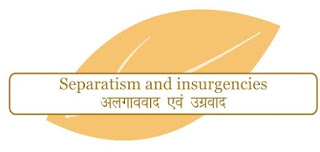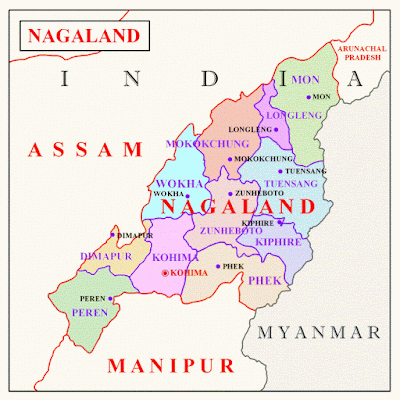The AFSPA is a tool to control and crush insurgencies and separatist movements. Supreme Court draws a line on its implementation.
The big debate on AFSPA
[ ##thumbs-o-up## Share Testimonial here - make our day!] [ ##certificate## Volunteer for Bodhi Booster portal]
- Handling disturbed areas : The Armed forces (Special Powers) Acts are Acts of the Indian Parliament that give special powers to the armed forces in disturbed areas, to handle the local situations more effectively. The Acts are : (1) Armed Forces Special Powers (Assam and Manipur) Act, 1958, (2) The Armed Forces (Punjab and Chandigarh) Special Powers Act, 1983, and (3) The Armed Forces (Jammu and Kashmir) Special Powers Act, 1990.
- Where active now : It is in force in Assam, Jammu and Kashmir, Nagaland, Manipur (except the Imphal municipal area). In Arunachal Pradesh, only the Tirap, Changlang and Longding districts plus a 20-km belt bordering Assam come under its purview. And in Meghalaya it is confined to a 20-km area bordering Assam. The state or central government considers those areas as ‘disturbed’ “by reason of differences or disputes between members of different religious, racial, language or regional groups or castes or communities.” The state governments can suggest whether the act is required to be enforced or not. But under Section (3) of the AFSPA act, their opinion can be overruled by the governor or the Centre. Check images at the end of this post.
- The Acts of 1958, 1983, 1990 : The first such Act was passed on September 11, 1958, which was applicable to the Naga Hills. Actually, in 1951, the Naga National Council(NNC) said it had conducted a "free and fair plebiscite" in which about 99 % of Nagas voted for a ‘Free Sovereign Naga Nation’. The government tried to control the situation, but failed, and finally the 1958 Act was made. During the next ten years, it spread to seven other states in the north-eastern region. Another Act was passed in 1983, which was applicable to Punjab and Chandigarh, which was subsequently withdrawn in 1997. The third such Act, passed in 1990, was applicable to Jammu & Kashmir, and has been in force there since then. J&K had its own Disturbed Areas Act (DAA), a separate legislation that came into existence in 1992. After the DAA for J-K lapsed in 1998, the government reasoned that the state can still be declared disturbed under Section (3) of AFSPA.
- Constitutional powers : The Articles in the Indian Constitution empowering state governments to declare a state of emergency pertain to these reasons : (a) Failure of the administration and the local police to tackle local issues, (b) Return of (central) security forces leads to return of miscreants/erosion of the "peace dividend", (c) The scale of unrest or instability in the state is too large for local forces to handle. (Historical fact : The Armed Forces Special Powers Ordinance of 1942 was promulgated by the British on 15 August 1942 to suppress the Quit India Movement!)
- Wide-ranging powers : AFSPA gives wide ranging powers to the armed forces to fire upon and use other kinds of force, destroy arms, hide-outs or training camps of people working against law, to arrest without warrant, to search any premises, and vehicles. Army officers earlier had immunity for their actions, which was ended by the Supreme Court judgment of July 8, 2016.
- Lot of criticism : The AFSPA has been severely criticized by politicians, thinkers and analysts and human rights activists both nationally and internationally as a tool of sate abuse, oppression and discrimination. When India presented its second periodic report to the United Nations Human Rights Commission (UNHRC) in 1991, members asked numerous questions on the validity of AFSPA and also asked if could be justified in light of Article 4 of the International Covenant on Civil and Political Rights (ICCPR).
- Deep Dive : Read all about Indian paramilitary forces here. Don't forget to rate and comment on that page!
- Manipur petitions and SC : On petitions by hundreds of families from Manipur, the Supreme Court in its judgment of July 8, ended the immunity provided to the army officers, and held that every death caused by the armed forces in disturbed areas should be thoroughly probed, irrespective of whether the victim is a dreaded criminal, militant or terrorist or an insurgent.
- What SC said on 08-July, 2016 : “It does not matter whether the victim was a common person or a militant or a terrorist, nor does it matter whether the aggressor was a common person or the state. The law is the same for both and is equally applicable to both... This is the requirement of a democracy and the requirement of preservation of the rule of law and the preservation of individual liberties.”
- Other Commissions and Reports : (1) Santosh Hegde commission on Manipur encounter deaths (constituted 2013, Head : retired SC judge S Hedge) to probe six encounter deaths in Manipur. Its report that the probe showed that none of the victims had any criminal records, (2) Justice Jeevan Reddy Commission : The commission recommended to repeal AFSPA as “the Act is a symbol of hate, oppression and instrument of high handedness” but Government of India has not taken any decision in this direction, (3) Second Administrative Reforms Commission : It recommended to amend the Unlawful Activities (Prevention) Act, 1967 inserting a new chapter to deploy the armed forces of the Union in the North eastern States. It supported a new doctrine of policing and criminal justice inherent in an inclusive approach to governance.
- Government’s plea not accepted : The court turned down the government plea that lack of immunity from prosecution would have a demoralizing impact on the security forces, saying that citizens could not live under the fear of the gun in a democracy.
- Controlling insurgencies difficult : The Central government, on April 11, 2017 filed a curative petition urging for the dilution of the Supreme Court’s earlier judgment of making FIRs mandatory for encounter deaths during counter-insurgency operations by the armed forces. A curative petition is the last legal recourse available after a litigant exhausts all remedies. If that too fails, it may end up having a chilling effect on the defence forces’ ability to strongly handle the insurgents.
- Do check out exams-focussed Confidence Booster series of learning resources, here! For developing your word power, go to our Vocabulary Boosters here
- Download Resources : Also, download many PDFs on military and defence from our Bodhi Resources page here
- Some images and facts will make the context clear. We are giving the detailed district-wise maps of the north-eastern states to help you understand the micro details of AFSPA implementation there.
Human rights organisations have gone hammer and tongs on AFSPA
Please Rate & Comment - Thanks :)
Enter Name & Email ID and SUBMIT, or log into FB / Google and SUBMIT - we don't store/use your personal data
Amazing Courses - Online and Classroom
Useful resources for you
[Newsletter ##newspaper-o##] [Bodhi Shiksha channel ##play-circle-o##] [FB ##facebook##] [हिंदी बोधि ##leaf##] [Sameeksha live ##graduation-cap##] [Shrutis ##fa-headphones##] [Quizzes ##question-circle##] [Bodhi Revision ##book##]



































COMMENTS